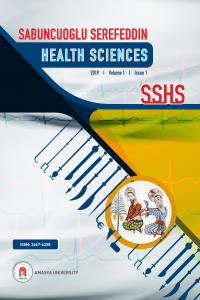Abstract
References
- Referans1 .Errando CL, Sigl JC, Robles M. et al. Awareness with recall during general anaesthesia:a prospective observational evaluation of 4001 patients. Br. J. Anaes h. 2008 Aug;101(2):178-85. doi: 10.1093/bja/aen144. Epub 2008 May 30.
Investigating The Effects Of The Induction Agents Propofol And Thiopental On Awareness During Intubation And Operation In General Anesthesia During Cesarean Section
Abstract
Aim: In
addition to contributing to post-operative psychological disorders, awareness
causes fear in patients undergoing surgery. In cesarean section operations,
developing awareness due to low anesthetic procedures cause high risk in these
patients. Thus, reducing awareness by maintaining and achieving the depth of
anesthesia has become very important.
Material and Method: Forty patients undergoing caesarean section operation
were divided into two groups. In the first (propofol) group, the induction of
anesthesia was done by 2.5 mg/kg propofol and 0.6 mg/kg rocuronium. In the
second (thiopental) group, anesthesia was induced by 5 mg/kg thiopental and 0.6
mg/kg rocuronium. In both groups after the baby was extracted, the anesthesia
was maintained with desflurane. Patients’ systolic and diastolic blood
pressure, heart rate, Evans Score, and Bispectral Index (BIS) values were
recorded every 5 minutes.
Results: When two groups were compared in terms of awareness no significant
difference was observed. However, despite BIS values being within the normal
limits (<60), awareness values were high.
Conclusion: Many studies have shown that, for anesthesiologists,
awareness is still a serious problem during the initial stages of application
of general anesthesia. In this study, the comparison between propofol and
thiopental did not show any significant differences, but although the BIS
values were within normal limits the awareness values were high.
References
- Referans1 .Errando CL, Sigl JC, Robles M. et al. Awareness with recall during general anaesthesia:a prospective observational evaluation of 4001 patients. Br. J. Anaes h. 2008 Aug;101(2):178-85. doi: 10.1093/bja/aen144. Epub 2008 May 30.
Details
| Primary Language | English |
|---|---|
| Subjects | Health Care Administration |
| Journal Section | Research Articles |
| Authors | |
| Publication Date | August 30, 2019 |
| Submission Date | August 1, 2019 |
| Published in Issue | Year 2019 Volume: 1 Issue: 1 |

